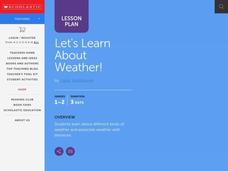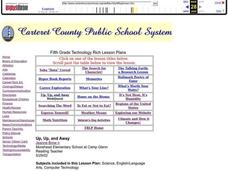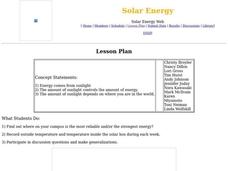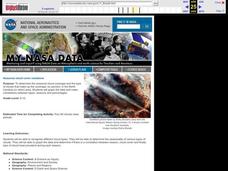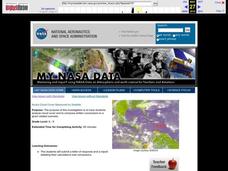Curated OER
Send in the Clouds
Students culminate a study of the water cycle by following step-by-step directions to make a three dimensional cloud. On the model, they draw a diagram of the water cycle and label it, and add a written report they completed in a...
K20 LEARN
Ecosystems, Human Activity, And Interactions, Oh My!: Human/Environment Interaction
Word clouds about ecosystems hook learners into a lesson that explores Yellowstone wildlife. Young scientists create cause-and-effect relationships after examining data and recommend solutions to their observed problems. More data...
Concord Consortium
Energy of Bond Formation
Show your chemistry class that there's much more to covalent bonding than sharing electrons! Pupils manipulate atoms of hydrogen, oxygen, and carbon to observe the energy of bond formation using a well-rounded interactive. The resource...
NOAA
The Climate Team: Make a Solar Heat Engine
Learners investigate how solar energy is converted into heat in part two of the 10-part Discover Your Changing World series. They build and test homemade solar cookers to boil water and cook rice. Pupils consider the impact of heat...
Curriculum Corner
Books to Purchase
What was that book you wanted to get for your class? Make sure you remember each book you desire by making a note on this record page whenever you think of one. Included are PDF and editable Word document versions.
American Chemical Society
Condensation Station
Where does the water come from? Pupils conduct an experiment to learn more about condensation. Scholars fill two cups with ice water and isolate one from the surrounding air. They then use a coffee filter to compare the amount of water...
Curated OER
Weather Report Chart
Young scholars complete a weather report chart after studying weather patterns for a period of time. In this weather report lesson plan, students measure temperature, precipitation, cloud cover, wind speed, and wind direction for a...
Curated OER
To Spread or Not to Spread
Students explore the difference between the three types of contrails. In this contrails instructional activity, students make observations of contrails and record them. Students identify the three types of contrails and complete an...
Curated OER
Let's Learn About Weather!
Students read several weather-related stories. They brainstorm weather words and use them as they make a weather booklet that includes pictures, a story of their own, and observations they make about the weather outside on that day.
Curated OER
Water and the Earth
In this water and Earth activity, students read a 2 page article on water and the Earth, name the clouds in 2 pictures and then list 4 sources of water in nature.
Curated OER
Visual Opacity
Students discover the difference between transparent, translucent and opaque. They use those descriptions to classify clouds. They create a presentation in which they show the different types of clouds with their descriptions.
Curated OER
The Sky and the Dichotomous Key
Students use a dichotomous key to distinguish between different types of clouds
Curated OER
Rising Air
Young scholars investigate the concept of rising air in the formation of clouds and precipitation. In this rising air lesson, students conduct an experiment with hot and cold water that shows how warm water rises due to thermal buoyancy....
Curated OER
Up, Up, and Away
Fifth graders participate in a WebQuest that introduces them to a study on clouds and how they relate to weather systems.
Curated OER
It Looked Like...
Second graders listen to a read aloud of Charles Shaw's, It Looked Like Spilt Milk. They complete an art activity in which they spill white paint on blue paper and fold it to make a design. They write about their design following the...
Curated OER
Solar Energy
Young scholars find out where on campus is the most reliable and/or the strongest energy, record outside temperature and temperature inside the solar box during each week, and participate in discussion questions and make generalizations.
Curated OER
Measuring Snowfall
Students predict the amount of snowfall for the week and measure snowfall. In this measuring snowfall lesson, student use a precipitation gauge to measure the week's snowfall; and analyze the data to determine whether or not...
Curated OER
Weaving Weather Maps with the World Wide Web
Learners access the Internet and use real time data from the American Meteorological Society to create a detailed weather map. They make weather predictions based on the data collected.
Curated OER
Weather in a Bottle
Fifth graders examine air flow, pressure, condensation and examine how to read a weather map. In this informative instructional activity students learn vocabulary then see how these terms can be applied by viewing a few demonstrations...
Curated OER
Clouds and Your Weather
Seventh graders identify clouds and the weather associated with them. They use informational articles and personal weather observations to learn about the relationships between weather fronts and clouds.
Curated OER
Seasonal Cloud Cover Variations
High schoolers recognize different cloud types. They determine the seaonality of various types of clouds. They graph the data and determine if a correlation exists between season, cloud cover and type of clouds most prevalent during each...
Curated OER
Three Clouds Activity
Learners explore how clouds are produced through three different age-appropriate hands-on experiments.
Curated OER
Aruba Cloud Cover Measured by Satellite
Students analyze cloud cover and to compose written conclusions to a given related scenario. They submit a letter of response and a report detailing their calculations and conclusions.
Curated OER
Weather Predictions
Students play the role of weather personalities by making five day forecasts based on data gathered from observations, weather instruments, and weather maps. Each day a small group makes a class forecast for the next day and reviews the...










